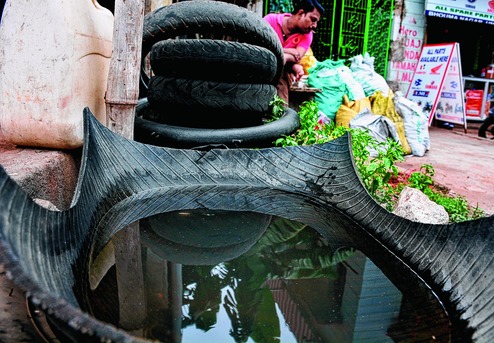
Bhubaneswar, June 20: The state health and family welfare department has issued advisories to the municipal corporation and other field functionaries to prevent spread of vector-borne diseases this monsoon.
This time, the health department is focussed on spreading awareness among residents about the prevention of diseases such as dengue, malaria, jaundice and diarrhoea. Water-borne diseases have been prevalent in the city in the recent past.
Last year, more than 50 persons from a slum, called Tarini Basti, had been affected by jaundice. A similar situation had arisen in 2015 as well when a few personnel at a CRPF camp were affected by the same disease. Besides, diarrhoea is a common disease as reflected in the records of the city's biggest health care delivery centre, Capital Hospital. It receives an average of 20 patients every day in its diarrhoea ward during monsoon.
The advisories ask the Bhubaneswar Municipal Corporation to conduct periodic checking of street food for its quality and regular fogging to eradicate mosquitoes. The civic body will also have to identify places where rain or wastewater remains stagnant and take preventive measures, so that these places are not conducive to mosquito breeding.
The state government today observed the Public Health Response Day to create community awareness and ensure involvement of all sectors to take up preventive measures such as elimination of the mosquito breeding sources, proper maintenance of sanitation, cleanliness and adopting hygienic practices.
"Prevention is always better than cure. We need to bring all those vulnerable into the fold in a manner that the diseases do not appear again. The civic body, dispensaries and health centres have been asked to take measures in a collaborative manner. It is found that the residents here are prone to get the water-borne diseases. So, we have put our main focus in that area," said health services director Kailash Chandra Dash.
Besides, the health department has also asked the school and mass education department to direct headmasters and parent associations to spread information. The electronic and print media will also be used to spread awareness on a larger scale. The urban local bodies have been asked to come up with their own standard operating system to avoid the disease based on the vulnerability of their area.
"We have received the directives from the health department. As in the past, we will take measures before the rains start in the city. We have decided to convene a meeting and start adopting the measures. The city health officer will monitor the drive, along with other field functionaries," said mayor Ananta Narayan Jena.
"Collaborative efforts are necessary to sensitise the citizens. The urban poor does not know how to prevent the diseases. They should be given information on how to adopt safe practices," said Kharavela Nagar resident Harapriya Mishra.
The Public Health Engineering Organisation has already initiated the process to disinfect water using chlorine dioxide to prevent water contamination. In the past, faecal contamination was detected as the reason behind jaundice outbreak in the city. The corporation has also taken up awareness drive and intensified fogging after the appearance of the disease in the past.










